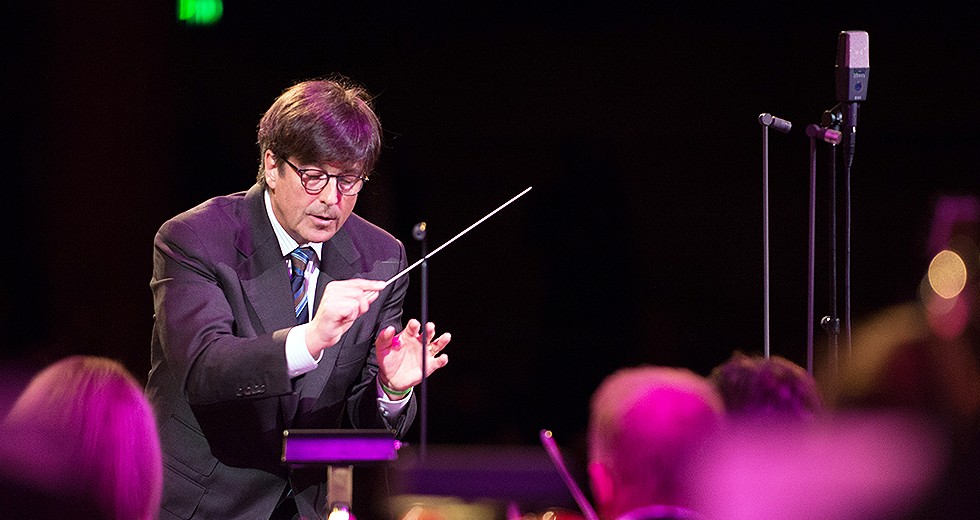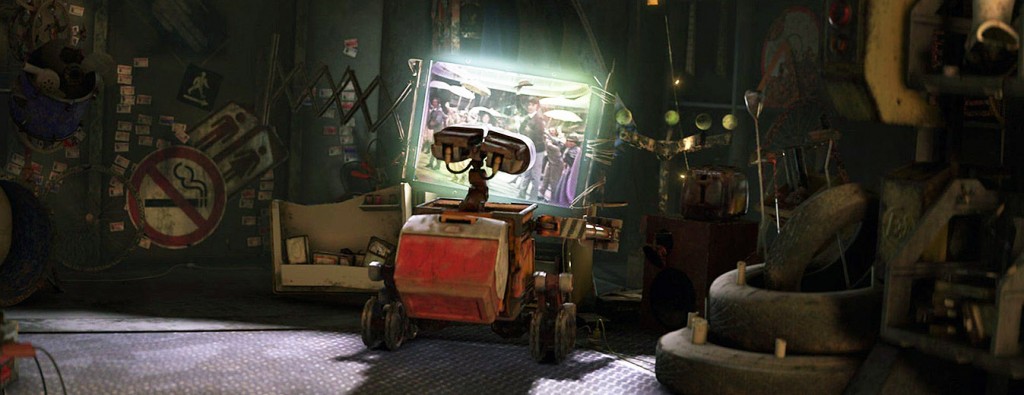
To say that Thomas Newman has film music in his genes is a considerable understatement. He is a member of a Hollywood dynasty that includes his father, Alfred, a two-decade music director of 20th Century-Fox and winner of nine Academy Awards; his brother, David, who has written scores for more than 100 movies; his uncles, acclaimed film composers Lionel and Emil, and his cousin, Randy, a famed singer-songwriter who turned successfully to film work in the 1980s. Even his sister Maria, a prominent classical violinist and composer, has taken a turn in the cinematic world, creating chamber scores for nearly two dozen vintage silent movies. Given these and other familial musical connections, there seems little doubt where Newman would wind up. “Pre-ordained would be a romantic way of putting it,” he said. “There may be a little ‘by default.’ ”
Doing his part to continue the family business, Newman, 59, has composed more than 70 film scores since his first for “Reckless” in 1983. Along the way he has been nominated for 12 Academy Awards, and indeed, he is the most nominated living movie composer not to have won an Oscar. While one nomination was for best original song, the rest have been in the category of best original score, including “The Shawshank Redemption” (1994), “American Beauty” (1999) and most recently, “Saving Mr. Banks” (2013).
He is one of four composers who have written the music for 14 Pixar animated films, penning the Academy Award-nominated scores for “Finding Nemo” (2003) and “WALL-E” (2008). (Newman was also chosen to write the music for the upcoming Pixar movie, “The Good Dinosaur.”) Musical excerpts from those two scores as well as the 12 others, including “Toy Story” (1995), “The Incredibles” (2004) and “Cars” (2006), will be featured Nov. 28-30, when conductor Richard Kaufman and members of the Chicago Symphony Orchestra present “Pixar in Concert.” (The first concert is part of the CSO at the Movies series, and the other two are SCP Special Events.) The program, which is scheduled for performances by dozens of orchestras worldwide, pairs musical selections with clips from the movies for which they were written.
Even though Newman had already worked on dozens of live-action movies by the time he took on “Finding Nemo,” he was intimidated by the prospect of trying his hand at animation. “When I did ‘Nemo,’ I used to say that it was going to be my first and last animation movie,” he said. “It was so daunting, and the muscles are so different that I was fairly terrified when I did it, with the thought, ‘Can I get through it? And will I have the [musical] vocabulary for it?’ Then, of course, when I was done, it was like running six miles. You think, ‘Oh, that was great,’ but it sure hurts along the way.”
One difference, for example, between live-action and animated films is the faster speed at which the latter progress. “So there are not nearly as many moments for kind of lingering feelings,” he said. “In live action a lot, we can kind of hide behind a mood that lasts a minute or two or three minutes, but in the case, of animation, it’s five or 10 seconds and then a transition.”

To pass the time at his desolate post, a robot watches the musical “Hello, Dolly!” in the Pixar film “WALL-E” (2008). The animated classic was scored by Thomas Newman, whose uncle Lionel won an Oscar for the 1969 film musical’s score. “WALL-E” is one of 14 films featured in the “Pixar in Concert” program.
According to Newman, there is no over-arching, Pixar-prescribed musical style or approach for its films. “Pixar is all about the film that is in front of them,” he said. So he collaborated closely with Andrew Stanton, the director of both of the Pixar films he worked on, in determining what kind of music made dramatic and emotional sense for each.
Even though Newman’s career as a film composer might seem like a given, he did not see it that way. “I never imagined myself doing this,” he said. “The idea was terrifying: How do you write music in a prescribed period of time? And then, how is it good and how do you please the people who are asking you write it?”
The composer actually began his career working in musical theater, and as he described it, kind of happened on to film composition. Of course, it didn’t hurt that his family connections helped him get a scoring assignment for a 1979 episode of television show “The Paper Chase,” and a chance to orchestrate a scene in “Return of the Jedi.” Then, shortly thereafter, he met New York-based producer Scott Rudin, who invited him to write the score for “Reckless.” “How could you say no?” Newman said. “How could you miss out on the opportunity? And then I just kept at it [film composition] and found that maybe I had something meaningful to contribute.”
Since that first film score, Hollywood has changed significantly. “It’s more crowded, not just in music but everywhere,” Newman said. “There are more people doing it, and therefore, sometimes a lot more people in your way. I think technology has advanced to such a degree that the poetry of being a composer is kind of lost in the melee of presentation and temp scores.”
More than ever before, he said, the movie business operates on a business rather than a creative model, with fewer chances for serendipity and improvisation. In addition, many specific expectations of a film score — a lyrical swell here, a loud blast there — are locked in before a composer even has a chance to share their ideas. “I started this in ’83,” Newman said, “and mostly it just seemed like a dreamier time. You could have big dreams, and they weren’t ridiculous. Now, it seems like it’s a lot more of a practical world, which at its worst, doesn’t invite much collaboration.”
As pessimistic as that characterization might sound, Newman still finds opportunities in the cinematic world to write fresh, sometimes unexpected music. “The best directors want that,” he said. “They want to be surprised. Why wouldn’t they? They want to think, ‘Aw, I never would have thought of that, and that is a delightful choice.’ As opposed to: ‘It’s a good idea, but it’s not my idea.’ ”
One recent collaboration that Newman holds up is his work with director British director John Madden on “The Best Exotic Marigold Hotel” (2011). An art-house hit, it tells the story of a group of British retirees who travel to India to take up residence in what turns out to be a much less luxurious hotel than they were expecting.
“I remember asking John, ‘Why me?” Newman said. After all, Newman is American and knew little about Indian music. Madden acknowledged such seeming liabilities but still wanted him for the job. “I guess I took that mean that he had a trust in my dramatic sensibility, and in the end, for the movie to emote, he was going to trust in my ability to do that,” the composer said. “He’s one of those guys who want to love it and wanting to love it is often letting go of expectations in an honest way. I think he would have encouraged me to do anything and to try anything. It was a great collaboration between the two of us — one of the most successful.” And in fact, the two reunited for a sequel, which scheduled to be released in March.
Kyle MacMillan, former classical music critic of the Denver Post, is a Chicago-based arts writer.
TOP: Thomas Newman conducts his Academy Award-nominated score for “Saving Mr. Banks” (2013) at an Oscar showcase earlier this year. | Photo by Matt Petit